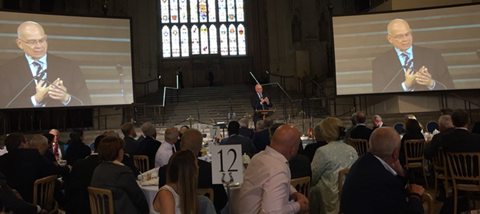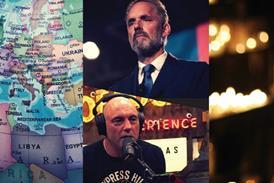In an address to the National Prayer Breakfast in Parliament attended by Prime Minister Theresa May, New York pastor Tim Keller told over 140 MPs, and many church leaders, that self-sacrifice is the way for Christians to be salt and light in society today. Here’s a transcription of his speech: What can Christianity offer our society in the 21st century?

Isaac Watts has a hymn in which he talks about peculiar honours – this does feel peculiar for me – as an American talking to you about this subject, but it is an honour. I’m glad to be addressing you on this subject. The subject is: What can Christianity offer our society in the 21st century? And I’d like to answer that question from the last verse that was just read to you out of that famous passage: “You are the salt of the earth. But if the salt loses its saltiness, how can it be made salty again? It is no longer good for anything, except to be thrown out and trampled underfoot”(Matthew 5:13).
Now Jesus was using a metaphor – salt – and when salt is dispersed into meat it is both savoury and preservative. On the one hand it’s savoury – it brings out the taste, the best in the meat. But on the other hand, it’s a preservative – it keeps it from decaying. But only if the salt is salt, that is, only if it’s chemically different from the meat. If it’s not different chemically from the meat, then it’s of no use at all.
The metaphor Jesus is using is to say to his disciples that the Christians should be dispersed in the societies of the world. We’re the salt of the Earth, he says. That doesn’t mean ‘the ground’, it means the world, society. And in every society that means Jesus says: my disciples should be bringing out the best in that particular culture and preventing its worse tendencies as well. But only if Christians remain ‘salt’, which is different from the rest of the culture.
What would you do?
So, I’d like to unpack that a little bit and look at how Christians have been ‘salt’ in a massive way in Western society, how they still can be salt, but only if they stay themselves. Salt is only helpful to the meat if it’s not like the meat, if it’s itself.
First, Christianity has been massively ‘salt’ in our society already and it still is operating today. There is a professor at a major American university – a professor of history – that had, I think, a very effective way of helping his students see how Western society had developed over the years. Here’s what he would do with his students: he would give them a thought experiment. He would say: imagine it’s late at night and you are on a lonely street and you see a little old lady coming, walking along with a big purse filled with jewels and money. And here’s three things you know for this thought experiment:
- She would not be able to resist you
- She would not be able to identify you
- It’s not against the law to do it
Do you do it, yes or no and why?
So the first question he would ask them is: do you do it, yes or no? And of course, you wouldn’t be surprised to know that over the years – in spite of the fact that in this thought experiment it’s not against the law – virtually all of his students always said: “No, you don’t.” Then he would say: let me give you three reasons why and I want you to identify which one is your reason –
a) You don’t do it because, for you, to take that money from that person would mean you would be a weak person, you would be a dishonourable person. To pick on a weak person means you would be weak. You wouldn’t respect yourself, no one else would respect you.
b) You don’t take it because you think about her. You imagine what it would be like for her to lose that money, you imagine who might be dependent on her.
c) Something else – none of the above
And of course, you might guess, over the years almost 100 per cent of his students always picked b. And then he would begin to teach. He said: ‘a’ is a self-regarding ethic. It comes from a shame and honour culture in which strength and honour is what really matters. ‘b’ is an other-regarding ethic in which the ultimate value is love. Now, he said, when the pagan Anglo-Saxons met the monks they were in a ‘shame and honour’ culture and the reason they wouldn’t take that money is because they would be a weak person. But when the Christian monks came along, with this other-regarding ethic of love, the Anglo-Saxons thought: this is crazy. The only thing that holds society together is respect for strength and a certain amount of fear for strength; society would completely fall apart otherwise. And of course Christianity won, Christianity won out.
And this is where the professor would make his point: I don’t care whether you are a Christian or not in this room I don’t care even whether you believe in God; personally it doesn’t matter. The point is you have been shaped by Christianity. Your moral sense is not the moral sense of an eastern or ancient ‘shame and honour’ culture, in which strength is the most important thing. You have an other-regarding, an ethic of love, and that came from Christianity. Because the monks came saying: it doesn’t matter the social class of the person – it doesn’t matter your social class or their social class – everyone must be loved for their sake. Now, as soon as you begin to think about this you begin to realise how this worked itself out through Western civilisation. There’s all kinds of scholarship going on now – I can only gesture in the direction – Brian Tierney of Cornell University and a whole lot of other people have shown that the idea of human rights, the idea of every human being being of equal dignity and worth did not come up out of the Enlightenment, it came up in the Middle Ages and it actually came up out of Christian and Biblical roots.
Slavery and Christianity
For example, ancient cultures all accepted slavery, but the first person we know of, ever, that protested and said slavery is wrong per se, the institution is wrong per se; because human beings may not be sold because they are of infinite worth, was Gregory the Bishop of Nyssa, who in the 370s preached a very famous sermon in which he said – now, by the way, these are currencies I’m about to tell you – how many obols for the image of God? How many staters did you get for selling the God-form human being. For Jesus Christ who knows the worth of human nature has said an entire cosmos is not worthy to be exchanged for a human soul. Who, (this is Gregory of Nyssa speaking), who can buy a man or sell a man once you realise he’s in the image of God?
Now that idea, which was unique in the world at the time, is the first voice to get up and say: no human being can be sold to another human being. That worked itself out so, as Brian Tierney points out, by the Middle Ages this idea that every human being is made in the image of God began to develop the idea of inalienable human rights for everyone, no matter what the race, what the class, no matter what the social status. And Martin Luther King Jr perfectly talked about it when he says in his sermon ‘The American Dream’: “You see the founding fathers were really influenced by the Bible. The whole concept of the imago dei – the image of God – is the idea that all men had something within them that God injected. Not that they had substantial unity with God, but that every man has a capacity to have fellowship with God and thus gives him a uniqueness, it gives him a worth, it gives him dignity. And we must never forget this as a nation (speaking of the United States of course) that there are no gradations in the image of God. Every human being, from a treble white to a bass black is significant on God’s keyboard precisely because every human being is made in the image of God. This is why we must fight segregation with all of our non-violent might.”
A very different voice, Jurgen Habermas, says: “The ideals of freedom, of conscience, human rights and democracy is the direct legacy of the Judaic ethic of justice and the Christian ethic of love.”
The very idea of human rights then, works itself out in a whole lot of different areas. David Bentley Hart, another scholar, talks about how our modern ideal of universal benevolence – helping the poor no matter where they are, helping the hungry no matter where they are – the whole idea of universal benevolence is a Christian idea that grew out of Christian roots.
Sexuality and Christianity
Dare I say something about sex? Yes, I dare. Kyle Harper a great scholar of antiquity, who writes in his great book From shame to sin that when Christianity started the Roman world sex ethic was completely based on shame and honour. The sex ethic was completely based on…the social order, the hierarchy. So, if you were a man of high social status and you were married, you could have sex with whoever you wanted. Your wife couldn’t. And no woman of lower social status could ever deny sex demanded by any man of a higher social order, she could never deny it. Along comes Christianity, Kyle Harper says, in what he calls “the first sexual revolution” and says all sex has to be consensual and covenantal. It has to be done by consent, mutual consent, in a covenant. And it was a revolution, because the Christian idea – the other-directed ethic of love started to work itself into every area.
Sarah Williams is going to be here to talk later on about the fact that we’re celebrating women’s rights, women’s suffrage where you will see historical research show that that had Biblical roots, that had Christian roots. OK, Christianity has not only been ‘salt’, it has been ‘salt’ so massively, the ideals that we all take for granted right now are the fruit of the Bible and Christianity. And therefore to even say: what can Christianity do for society now? Is a little churlish. It’s a little bit like saying: what have you done for me lately?
Future of Christian values
But, let’s suggest this: in the past, Christianity has been like salt bringing out the best in Western society, but, in the future, it might be more of a way of preventing decay, it might be more of a preservative. I’d like to talk about one problem that Charles Taylor, the great Canadian philosopher, talks about that I think would give us an example of this. Charles Taylor’s great book, Sources of the self: the making of modern identity, in that book he talks about what he calls a contradiction at the very heart of modern culture. Interestingly enough, he’s following Nietzsche here – completely following Nietzsche – and here’s what he says: he says that our modern culture is deeply incoherent over moral value. Because on the one hand, we have the highest moral ideals of any culture in history: we believe in the equality of every single human being, we believe that we should be seeking justice for every class, for every national group, for every race. We believe in alleviating suffering and hunger for every person on the face of the earth – that’s our ideals.
So, on the one hand we have these high ideals. On the other hand modern culture tells you that all moral value is socially constructed or maybe the product of our evolutionary biology. That all moral value is basically a subjective preference, and so, what Charles Taylor says is: we have these high moral ideals, but we don’t have the moral sources to support them. We say: look at these ideals! And then over here we say: really all morality is relative. And he says that creates a huge problem: we don’t have the moral sources to support our ideals. How so? Well I’ll give you two ways:
One way is this – it’s not the most important way, but it’s one of the problems. When modern people, certainly modern people who talk about human rights and human equality, when we talk to people who don’t share our values, all we can do is yell. See Supreme Courts of Justice Anthony Kennedy put the modern view of morality very well in a famous ruling in which he said: “At the heart of liberty is the right to define one’s own concept of existence of meaning, of the universe and of the mystery of life.” Now that’s definitely the message of the culture: you get to define your own meaning, you get to define right or wrong for you. But if that’s the case: why not be a racist? Why do I have to honour human rights? What Charles Taylor says is when Western people today, with our high ideals, meet non-Western people who don’t agree with our ideals, all we can do is say: well you’re just not enlightened like we are. And that’s the same Western, white imperialism that non-Western countries have been getting forever from us. Because all we can say is: you would understand if you were just as enlightened and educated as we are.
So one of the problems with having high moral ideals and no moral sources for them is that when we try to talk to people who don’t share our ideals, all we can do is yell. But a bigger problem is this: can we form people anymore in our society who can support those ideals because those ideals take self-sacrifice. The way Charles Taylor puts it is like this: we tell people, especially our young people, we say: you’ve got to be true to yourself. You’ve got to follow your own inner light. You can’t tell anybody what’s right or wrong for you. And not only do you have to be true to yourself, you have to be true to yourself no matter what your family says, or what your community says, or what society says. You don’t sacrifice for them, you make them adjust to you.
But then we say to them: but then you have to actually work for justice, and you have to work to alleviate hunger – which of course takes sacrifice. What that does is it takes giving up power, it takes giving up wealth, it takes giving up all sorts of things. So how are they gonna do that?
When Charles Taylor’s book Source of the self first came out and he made this point, an atheist reviewing it wrote this: “Perseverance and virtue will require self-sacrifice, and self-sacrifice seems to require some transcendental justification or motivation of which the most common, and perhaps the most logical, is belief in God, or so Taylor says, circumspectly. Since modern freedom entails the rejection of all transcendence, modern virtue is wholly contingent. Can we be good for long without God?”
“Taylor’s doubts,” he writes, “are daunting to me.”
The Amish community
But let me give you an example, just to put a fine point on what I’m talking about here – and what Taylor’s talking about. Not too far from where I grew up in Pennsylvania in October 2006 a gunman went to an Amish schoolhouse and took a bunch of little school children hostage. And during that whole crisis he shot and killed five of them – girls I think ages seven to thirteen – and then he killed himself. Within hours of the shooting, the Amish community had come around both the parents and the wife of that shooter, who lived there in that area, had come to them and expressed sympathy and said they wanted to be with them for the hard days ahead. When the shooter’s funeral occurred, more than half the people who were at the funeral were Amish people. And an Amish spokesman said that all the families who had lost children forgave the shooter and his family. And of course in America there was a huge amount of discussion about this: everybody was shocked at their ability to reconcile, to love, to reach out and what a lot of people wrote back then, I remember it clearly: this is what Americans are capable of, this is us at our best.
But two or three years later, three sociologists wrote a book called Amish Grace and in that book they wrote that: we should not think our Western society is capable of producing this sort of thing anymore. Forgiveness is an act of self-renunciation; forgiveness is an act of self-sacrifice; for the good of others, for the good of the community, forgiveness means I could pay back, but I’m not going to; it’s an act of self-renunciation of self-sacrifice. But, the sociologists said, our culture increasingly is a consumeristic culture, it’s an individualistic culture and it teaches self-actualisation, it teaches self-assertion and it teaches you never to do self-renunciation, never do that. And so, they said, we’re more and more going to become incapable of having people who can forgive, who can share power, who can make sacrifices, we’re just not producing them.
And, they said, but see: the Amish culture was based on Christianity. Here’s what the Amish culture was based on: we’re saved through what Jesus Christ had done. He had all glory, he had all power and had every right to be angry at us, his creation, for turning away from him. But instead he gave all that up – he gave and he gave and he gave. He gave up his glory and became a human being, he gave up his life and he went to the cross and died on the cross, as he was dying, saying: father, forgive them, they don’t even really understand what they’re doing.
And, what the sociologists said, on the basis of that – that we’re saved through the self-giving of Christ then we hear Christ saying: take up your cross and follow me, lose yourself to find yourself, don’t live for yourself anymore, but live for God and your neighbour. You see that’s drilled into the Amish and as a result they can do that, but that’s not drilled into us. What we need in our society, which is producing self-actualisers, self-asserters, we need millions of people who’ve been shaped by the self-giving of Jesus Christ, who say: I’m a Christian because of Jesus’ self-giving and we’re able to say therefore I live for God and for my neighbour, not necessarily for myself because I’ve got everything I need in him.
Christians must not lose their 'saltiness'
Look, last point, simple last point: Jesus’ metaphor is Christians can be ‘salt’ as long as they’re ‘salt’ – meaning, not the same as the meat; they’re different. And so, Christians will not, interestingly, benefit society if they’re just like everybody else in society. We’re not going to benefit a society filled with self-actualisers unless we really are different, unless we do believe Jesus died for us, unless we do believe that we live through the self-sacrifice of the great Jesus Christ, and therefore we’re going to live by self-sacrifice. You see, unless we are shaped deeply by that, then we’re really not going to be of any kind of benefit.
Larry Hurtardo of the University of Edinburgh has written some books on early Christianity recently and one of his books is called Why on Earth did anyone become a Christian in the first three centuries? He says that, as a historian, you have to ask that question because Christians were the most persecuted of any religion. So why would you become a Christian at a time where there was no social benefit to you, no social benefit at all? And he said there’s two answers. One is: some people say, well Christians love their community, right? He says no: everybody was in community. Everybody had their clans, everybody had their families – it’s not like we lonely people today, back then nobody was looking for community. No, they didn’t go to Christianity for community.
Some people say: well, was it because Christianity offered miraculous healing? And the answer is: yeah, but all the religions offered miraculous healing. What was different about Christianity? No social benefit and yet people became Christians and it grew and grew and grew. Why?
It offered two things, Hurtardo says: one is communing with God – not just favour of the gods, but a love relationship with God through the free gift of eternal life. Every other religion you have to earn, you have to work hard, you have to be a good person. Christianity said: no, no, Christ has gone to the cross and through his sacrifice has procured your salvation, so if you believe in him – his death and his resurrection – you get forgiveness now. And there it is: to say – in myself I am unworthy, but in Christ I am absolutely loved perfectly, infallibly, without condemnation, because of his sacrifice. That’s what turns you into a person who can be ‘salt’. That’s where all those values go, that’s where the other-oriented ethic comes from. That’s where the infinite value of the human soul comes from. Christians, you’re only going to be of benefit to society if you stay different, if you don’t become like the society: self-actualising. If you stay self-sacrificers and self-givers.
And here’s what the British society can do to get the most out of Christians: not demand that they become like everybody else. Our modern society says: we believe in respect for difference. Ok, respect Christians’ difference. But here’s what you should do for them, oh British society, (I guess if there’s any place to talk to British society, I guess this is the place to do it). Oh British society, tell Christians: be true to your own ideals. And critique them on the basis of their ideals, don’t critique them on the basis of somebody else’s, critique them on the basis of their own ideals. How fair that is but how good that will be. We deserve the critique. How good that is and how fair that will be for British society, for Western society.
Listen to the whole National Prayer Breakfast service in Parliament, including the address by Tim Keller, on Premier Christian Radio at 9pm this Sunday 24th June 2018.
































